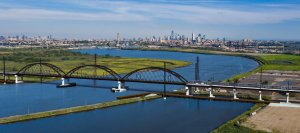
A rendering of the Portal North Bridge from Gateway Development Corp.’s media center. Photo ©Gateway Program Development Corporation.
The 110-year-old Portal North Bridge carries approximately 450 trains and 200,000 passengers on an average day, and is in need of repair. CAIT helped to secure new funding from FRA that will allow NJ Transit and other stakeholders to advance these vital infrastructure projects.
U.S. Senators Bob Menendez and Cory Booker, along with other state representatives recently announced more than $91.5 million in funding from the Federal Railroad Administration (FRA) to advance the replacement of the Portal Bridge and make other upgrades to improve service along Amtrak’s Northeast Corridor (NEC).
The Northeast Corridor generates one-fifth of the nation’s economy, and the NEC Commission estimates that a disruption of the NEC from Boston to Washington, D.C. would cost the country $100 million a day in lost production and economic activity, according to a press release.
Long considered the linchpin of the entire NEC connecting Boston to Washington, D.C., the 110-year-old Portal Bridge carries an average 450 trains and 200,000 passengers each day. But, the bridge is in need of repair and has become a major source of delays for commuters recently.
To address these issues, FRA has awarded Amtrak $55,100,000 toward the federal cost share for the Portal North Bridge Project, and NJ Transit has been awarded $36,408,410 to reconstruct electrical substation 41 in Kearny, NJ that supplies power to a stretch of the NEC and existing Hudson rail tunnels leading into New York Penn Station.
The Rutgers Center for Advanced Infrastructure and Transportation (CAIT) assisted with the project by providing the cost benefit analysis required to secure federal funding for the substation to help strengthen resilience along the NEC.
“Investment in infrastructure is vital to the economy here in New Jersey and nationally,” CAIT Director Dr. Ali Maher said. “At the Center, we were happy to put our cluster of research knowledge and expertise to use in helping secure funding for these vital investments.”
Officials said that the new, more resilient substation is expected to allow for faster, more dependable train service and, when connected to NJ Transit’s independent power generation system, it will provide reliable power for the NEC in event of regional blackouts, severe weather, or cyber-attack.
For the Portal North Bridge, the plan is to build the new span 50 ft. above the Hackensack River, negating the need to open for passing marine traffic, according to the press release. This will allow trains to run at faster speeds and substantially reduce delays along the NEC due to openings for waterway traffic and ensuing mechanical failures.
“New Jersey’s rail infrastructure is vital to the economic health of not only our state, but our region,” Sen. Booker said. “The reality is this critical infrastructure is crumbling beneath our feet, with the century-old Portal Bridge serving as a bottleneck for the entire Northeast Corridor. This federal infrastructure investment will help provide much-needed relief to New Jersey commuters who depend on reliable, safe rail transit. But our work is far from over. We must remain focused on long-term solutions to replace our obsolete infrastructure by moving projects like Gateway forward in order to help strengthen our economic growth, boost job creation, and ensure commuter safety.”
NJ Transit President and CEO Kevin Corbett said that the grants are critical to the overall reliability of the NEC, and thanked partners involved in the project.
“We are extremely grateful for these two grant awards, which are critical to the advancement of the Portal North Bridge project and the overall reliability of the NEC. As agency for the replacement of Portal North Bridge, along with my role as Co-Chair of the Northeast Corridor Commission with FRA Administrator Ron Batory, there is no higher priority at NJ TRANSIT than getting shovels in the ground to restore reliability for the 450 NJ TRANSIT and Amtrak trains a day that cross the Portal Bridge,” he said. “We thank the USDOT, our partners at the FTA and FRA, and the NJ Congressional Delegation for their continued support of these critical projects.”

